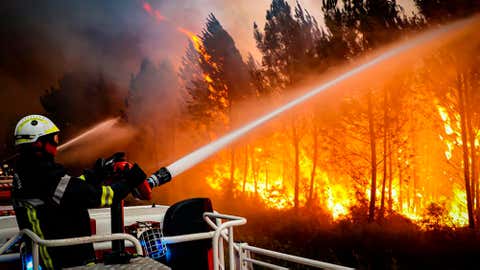
At a Glance
- Parts of the U.K. could see temperatures rise above 104 degrees.
- A red extreme heat warning was issued there for the first time ever.
- Two wildfires have burned at least 27 square miles in southwestern France.
Wildfires are scorching parts of France and Portugal and temperatures in the U.K. could top 104 degrees for the first time on record as extreme heat takes over much of Europe.
Britain's national weather agency, known as the U.K. Met Office, issued its first-ever red extreme heat warning Friday. The warnings, in place for Monday and Tuesday, cover much of southern England, where temperatures could reach 40 degrees Celsius - or about 104 degrees.
"Nobody alive has seen a temperature of 40 degrees Celsius in the U.K." weather.com senior meteorologist Jonathan Erdman pointed out. "That would be a hot day this time of year in Dallas or Houston, much less London."
In fact, a temperature that high has never even been forecast in Britain, according to the Met Office. The current record high temperature for the U.K. is 38.7 degrees Celsius - about 102 degrees Fahrenheit - set on July 25, 2019, at Cambridge Botanical Garden, about 50 miles north of London.
Travel around London may be snarled on Monday and Tuesday by the heat. Passengers of the London Underground are being told to avoid the popular transit system unless absolutely necessary.
“If customers do need to travel, they should check before they travel as we are expecting there to be some impact to Tube and rail services as a result of temporary speed restrictions we will need to introduce to keep everyone safe,” Andy Lord, chief operating officer of Transport for London, which runs the capital’s transportation system, told the Associated Press.
(MORE: Why July Is The Deadliest Month For Lightning)
Similar highs are expected across parts of France, where some of their hottest days on record are possible in the lower western half of the country.
The heat, which also extends to other parts of the region, is fueling several wildfires.
Two wildfires in the Bordeaux region of Southwest France had chewed through more than 27 square miles and forced the evacuation of more than 11,000 people as of Saturday morning. Some 1,000 firefighters battled the flames, according to The Associated Press.
Fires are also burning in Portugal and Spain.
In Portugal, the pilot of a firefighting plane died Friday when his plane crashed while on an operation in the northeast, according to the AP. It was the first fatality in fires in Portugal so far this year, which injured more than 160 people this week and forced hundreds to be evacuated.

This is the latest in a series of dangerous heat waves to bring record-breaking, potentially deadly temperatures to parts of Europe in recent decades.
The worst was in August 2003. Several analysis of deaths during that time estimate that about 70,000 people across Europe died because of the heat that summer.
Scientists say climate change is making heat waves worse.
World Wide Weather Attribution, a panel of researchers that studies what role climate change plays in extreme weather events, concluded that 2003's extreme temperatures - as well as European heat waves in analyzed in 2010, 2015, 2017, 2018 and 2019 - were found to be much more likely and more intense because of human-induced climate change.
The Weather Company’s primary journalistic mission is to report on breaking weather news, the environment and the importance of science to our lives. This story does not necessarily represent the position of our parent company, IBM.



